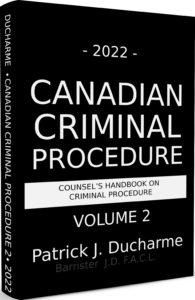 |
| Patrick Ducharme |
While the standard of a lawyer’s assistance of any client can never be expected to provide a standard of perfection, the lawyer still must be both candid and honest in every aspect of advising the client. In addition, the lawyer has special duties owed to the client because of the nature of trial work. These duties include:
1 a duty to hold in strict confidence all information acquired in the course of the professional relationship concerning the affairs of the client.
2 the lawyer must not advise or represent both sides of a dispute. The lawyer must also advise of any possible conflicting interest that would likely affect adversely the judgment of the lawyer on behalf of his loyalty to the client.
3 when acting as an advocate the lawyer must, while treating the court with courtesy and respect, still represent the client resolutely, honourably and within the limits of the law.
4 the lawyer has a duty to attempt to learn every aspect of the client’s case and to interview potential witnesses that may be helpful to his case, and even witnesses that may be called by the Crown if those witnesses are available and willing to meet with counsel for the accused. In these circumstances counsel for the accused should be careful not to make himself/herself a witness in the case. Therefore, witnesses that are likely to be called by the Crown should be interviewed by an independent third-party who will be available to testify for the client if valuable information is obtained on the interview of the witness.
5 concerning fees charged by the lawyer, the lawyer should not accept any fee that is not fully disclosed, fair, or reasonable.
a fair and reasonable fee will depend upon and reflect such factors as:
a) the time and effort required and spent.
b) the difficulty and importance of the matter to the client.
c) the special skill or service required and provided.
d) the customary charges of other lawyers of equal standing in the profession in like matters and circumstances.
e) the amount involved or the value of the subject matter to the client.
f) the results obtained.
g) any special circumstances of the client, including saving the client from loss of employment, incarceration, or other personal hardship or urgency.
h) adherence to the lawyer’s duty to his client not to withdraw his services except for good cause and upon notice appropriate in the circumstances.
i) to encourage the client to exhibit public respect for the trial process and the needs of the administration of Justice.
j) to make one’s legal services available to the public in an efficient and convenient manner.
k) to command respect and confidence in trial lawyers operating within the legal system and demonstrating the integrity, independence, and effectiveness of the profession in general.

The above is the an excerpt of Patrick J Ducharme's book, Canadian Criminal Procedure Volume 2, available at Amazon or in bulk through MedicaLegal Publishing along with Criminal Trial Strategies.
Subscribe to Patrick Ducharme's Youtube Channel
